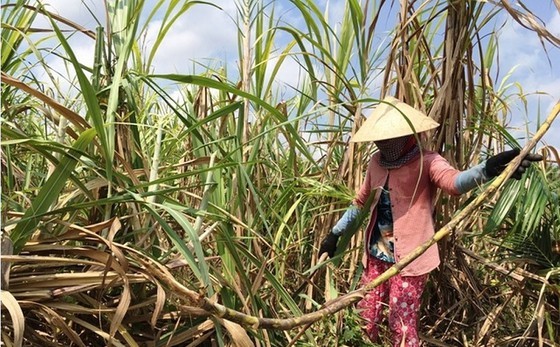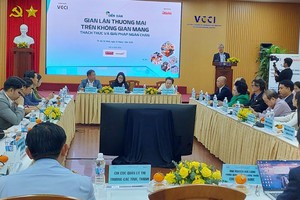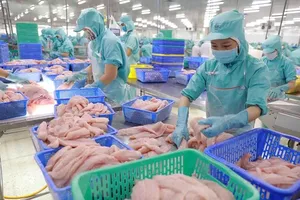
On September 21, the office of the Ministry of Industry and Trade (MoIT) informed the press that its leader decided to issue the Decision No.2466/QD-BCT to initiate an anti-dumping and anti-subsidy investigation on sugar imported from Thailand into Vietnam, based on the petition of the Vietnam Sugarcane and Sugar Association (VSSA) and domestic sugar refineries.
According to the MoIT, implementing Vietnam's commitments in the ASEAN related to the application of tariff quotas under the commitments of the World Trade Organization (WTO) to WTO member countries, Vietnam has eliminated the sugar import quotas for countries in the ASEAN as of January 1 this year.
However, in the first eight months of this year, the amount of sugar imported into Vietnam increased drastically, reaching nearly 950,000 tons, more than six times higher than that in the same period last year.
Of which, the amount of sugar imported from Thailand to Vietnam made up a majority, reaching nearly 860,000 tons, while it was 145,000 tons of sugar in the same period last year and 300,000 tons in the last year. According to the representative of the domestic sugar industry, the sudden increase in sugar imports was the fatal blow to the domestic sugar industry, causing domestic enterprises to lose market share and reduce production outputs. Specifically, the domestic sugar production in the 2019-2020 crop is estimated at less than 800,000 tons, much lower than the production of 1.2 million tons in the 2018-2019 crop.
Besides, the domestic manufacturing industry has provided information and evidence that sugar products imported from Thailand are being dumped into Vietnam, and the Thai Government has been maintaining some supporting policies for sugarcane growing activities of farmers and the sugarcane industry.
Therefore, the MoIT will investigate by the law to establish a fair competitive environment in the context of international economic integration, and protect the legitimate rights and interests of the domestic manufacturing industry from the anti-competitive practices from outside, the office informed.
According to the Law on Foreign Trade Management, the MoIT can impose retroactive anti-dumping and anti-subsidy duties on goods subject to tax for 90 days before applying temporary and retroactive anti-dumping and anti-subsidy duties.
Therefore, the MoIT recommends that organizations and individuals, in the process of signing contracts for importing, distributing, trading, and using goods that are under investigation, should pay attention to the possibility of being imposed temporary and retroactive anti-dumping and anti-subsidy duties.
According to the MoIT, implementing Vietnam's commitments in the ASEAN related to the application of tariff quotas under the commitments of the World Trade Organization (WTO) to WTO member countries, Vietnam has eliminated the sugar import quotas for countries in the ASEAN as of January 1 this year.
However, in the first eight months of this year, the amount of sugar imported into Vietnam increased drastically, reaching nearly 950,000 tons, more than six times higher than that in the same period last year.
Of which, the amount of sugar imported from Thailand to Vietnam made up a majority, reaching nearly 860,000 tons, while it was 145,000 tons of sugar in the same period last year and 300,000 tons in the last year. According to the representative of the domestic sugar industry, the sudden increase in sugar imports was the fatal blow to the domestic sugar industry, causing domestic enterprises to lose market share and reduce production outputs. Specifically, the domestic sugar production in the 2019-2020 crop is estimated at less than 800,000 tons, much lower than the production of 1.2 million tons in the 2018-2019 crop.
Besides, the domestic manufacturing industry has provided information and evidence that sugar products imported from Thailand are being dumped into Vietnam, and the Thai Government has been maintaining some supporting policies for sugarcane growing activities of farmers and the sugarcane industry.
Therefore, the MoIT will investigate by the law to establish a fair competitive environment in the context of international economic integration, and protect the legitimate rights and interests of the domestic manufacturing industry from the anti-competitive practices from outside, the office informed.
According to the Law on Foreign Trade Management, the MoIT can impose retroactive anti-dumping and anti-subsidy duties on goods subject to tax for 90 days before applying temporary and retroactive anti-dumping and anti-subsidy duties.
Therefore, the MoIT recommends that organizations and individuals, in the process of signing contracts for importing, distributing, trading, and using goods that are under investigation, should pay attention to the possibility of being imposed temporary and retroactive anti-dumping and anti-subsidy duties.
























